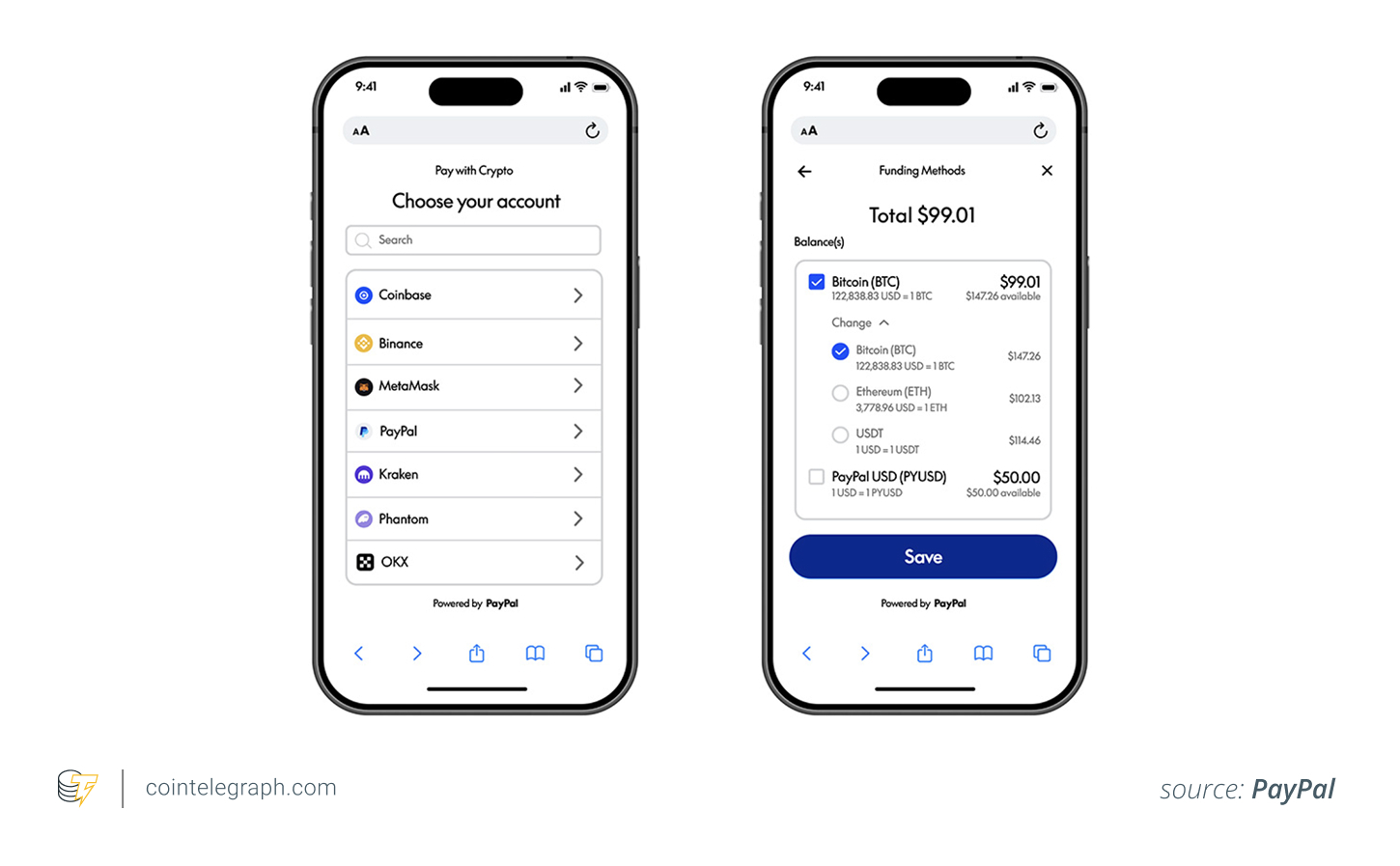Who Accepts Bitcoin, Ethereum, and XRP in 2025?
Key takeaways:
-
Coffee shops, fast-food chains like Starbucks and Sheetz and retailers like Microsoft and Home Depot are accepting crypto payments via apps and third-party processors.
-
More and more platforms are gradually enabling the use of Bitcoin, Ether and XRP for large-scale travel and airline reservations.
-
Luxury brands, high-end car dealerships and real estate developers are integrating crypto payments for premium goods and property.
-
Payment processors can make it simple for small businesses to accept crypto by instantly converting it to fiat currency and reducing compliance costs.
Cryptocurrencies are no longer fringe ideas in finance. As of 2025, more and more businesses are embracing digital assets, especially Bitcoin (BTC), Ether (ETH) and XRP (XRP) — both as payment options and strategic assets.
Why these three? Each has strong brand recognition, decent liquidity and different strengths: BTC as the store-of-value, ETH with its smart contract ecosystem and XRP with fast settlement and cross-border payments. Together, they cover what businesses need: trust, functionality and speed.
This article explores where BTC, ETH and XRP are used, from simple everyday purchases to large-scale airline integrations.
Everyday crypto transactions: Coffee shops, restaurants, retailers
For many crypto holders, the first real test is whether you can spend BTC, ETH or XRP like cash: a cup of coffee, a sandwich or groceries. XRP tends to lag behind BTC and ETH when it comes to everyday purchases: Fewer small shops accept XRP directly, as its strength usually shows in back-end or cross-border payments rather than point-of-sale in cafes.
Coffee shops and small eateries
So far in 2025, paying for coffee with crypto isn’t some sci-fi fantasy anymore. Plenty of chains and indie spots have already made it part of the daily grind. At Starbucks, for example, you can grab a Bitrefill gift card and cover your caramel macchiato with Ether or Bitcoin.
Apps like Flexa’s SPEDN wallet, or even reloadable digital gift cards, make it easy to swap tokens for lattes.
Even convenience stores are in it. Sheetz accepts Bitcoin, Ether and a handful of other coins at checkout. And if you’re more of an XRP loyalist, directories like Cryptwerk point you to smaller eateries happy to turn tokens into tacos or burgers.
Restaurants and fast food places
Select McDonald’s outlets in crypto-hot zones accept Bitcoin through payment apps, enabling fast food payments with digital dollars.
In Europe and the US, major fast-food chains like Subway and Burger King continue to accept crypto payments, often through third-party gift card services or payment processors. While not a direct, in-house integration for every location, it’s a simple way for consumers to spend their Bitcoin.
Steak ‘n Shake joined the party in May 2025, rolling out BTC payments nationwide, crediting it for an 11% sales boost by attracting tech-savvy diners. Chipotle and Baskin-Robbins are on board, too, via BitPay integrations, where ETH, BTC or XRP funds your burrito bowl or scoop.
Retail and online stores
AT&T lets you settle phone bills with ETH or BTC, dodging those pesky late fees. Many online and some physical retailers accept XRP via gateways like CoinGate.
Big tech firms have also been supportive: Microsoft accepts BTC directly or through processors, whereas Newegg also supports ETH for purchases on-site, and Overstock welcomes XRP as well. AMC Theatres accepts Bitcoin and other digital assets for its products and services, from Xbox content to movie tickets.
Beyond these giants, e-commerce platforms like Shopify have democratized the use of digital currency by making it simple for millions of small and medium-sized businesses to include a cryptocurrency checkout option.
Major chain retailers like Home Depot, Lowe’s and Ikea accept cryptocurrency in the form of Bitrefill and BitPay gift cards, so you can use ETH to finance your home renovation.
Scaling up: Travel and luxury
As crypto payments mature, many travel services and airlines, directly or via intermediaries, are offering bookings via BTC, ETH and sometimes XRP. When it comes to flights and hotel booking platforms, sites like Travala.com allow travelers to make bookings with BTC, ETH and many other supported digital assets.
In the near future, Emirates flyers will be able to snag first-class seats with digital dollars, no forex fuss. The UAE’s luxury liner will work with Crypto.com to accept crypto. In Europe, AirBaltic has been accepting crypto since 2014 and has processed thousands of crypto transactions.
High-end brands and luxury car dealerships are also entering the crypto payment space. For example, Post Oak Motor Cars in the US accepts Bitcoin for buying super-luxury cars via BitPay. In Europe, platforms like BitCars have built a crypto-only marketplace for premium and classic vehicles.
High-end brands are also joining in: Gucci and Ralph Lauren have continued to expand their crypto payment options at select flagship stores, particularly for their more exclusive collections.
Did you know? Alternative Airlines is a notable example since it supports over 600 airlines globally and allows payment using 100+ cryptocurrencies, including XRP.
Financial services, remittances and institutional adoption
When the usage moves beyond consumer transactions into payments infrastructure, institutional use, remittances and treasury operations, different strengths of BTC, ETH and XRP become more visible.
Remittance and cross-border payments
XRP is often positioned here because its consensus-based ledger and Ripple’s infrastructure are designed for lower cost and faster settlement for cross-border transfers. There are businesses such as Mercury FX and Cuallix that have adopted or trialed XRP for such uses.
Payment processors and gateways
In order to lessen their exposure to volatility, businesses are increasingly accepting cryptocurrency thanks to platforms like PayPal, BitPay and NOWPayments. In particular, PayPal has made it possible for retailers to use more than 100 cryptocurrencies, such as Bitcoin, Ether and XRP.
Treasury and corporate holdings
Some companies, such as BitMine, SharpLink Gaming and VivoPower, include crypto in their treasury portfolios for strategic purposes, inflation hedging or to get further involved in the cryptocurrency market.

How can more small businesses accept crypto?
The development of more user-friendly technologies and the larger financial ecosystem holds the answer.
Step 1: Choose a payment processor
Payment processors like BitPay, Coinbase Commerce and CoinGate make it easier for small businesses to integrate crypto payments with little technical know-how. By instantly converting cryptocurrencies into fiat currency, these processors eliminate the risk of price fluctuations.
Step 2: Reduce compliance costs
Small business owners’ financial and legal burden can be lessened by automated tax reporting systems and more open regulatory frameworks.
Step 3: Embrace a wider variety of digital assets
With technical barriers lowered and compliance simplified, businesses can confidently accept a broader range of cryptocurrencies.
This article does not contain investment advice or recommendations. Every investment and trading move involves risk, and readers should conduct their own research when making a decision.


